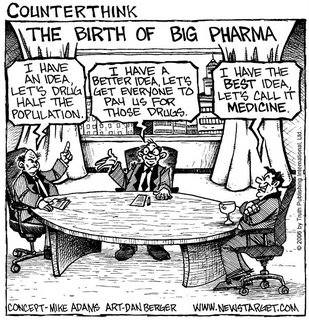
The Birth of Big Pharma (comic): "It's astounding: Nearly half the U.S. population is now taking a daily dose of one or more pharmaceuticals. The drug industry, which once merely hoped to medicate sick people, now has a more ambitious goal: medicate everyone, including people who aren't sick.
The way they do that, of course, is to engage in disease mongering (the invention and marketing of fictitious diseases that 'require' medication), false advertising, junk science, bribery of doctors, corruption of government regulators, control of the monopoly drug market, and the destruction of natural alternatives, to name a few of the tactics.
That modern medicine today is even called 'medicine' is astonishing. It has nothing to do with helping patients prevent disease or cure disease, and is almost entirely focused on 'managing' or 'controlling' disease symptoms through drugs that must be taken for a lifetime. The real scam, of course, is that patients actually pay for this sort of chemical abuse. Even worse, they're easily fooled into thinking it's 'medicine.'
Ask yourself a couple of simple questions: If pharmaceuticals make people well, then why is America the sickest nation in the world even though we take more drugs (per capita) than any other nation in the world? And if modern medicine is such a good deal, then why do Americans pay, by far, the highest rates for health care services of any nation in the world, when our mortality statistics are nearly identical to Cuba and China -- two countries that spend a tiny fraction of what we spend on health care? "